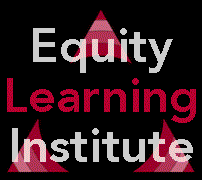
|
|
|
|
an EdChange project by Paul C. Gorski
|




|
Reading hypertext--from global culture to the discourse of individual identity Luís Manuel Mendes School of Education of Lamego (Polytechnic Institute of Viseu), Portugal March 1999 Hypertext is a mosaic of all possible texts and discourses. The variety of materials available and used (text, images, graphics, sound, video), in an electronic and digital form, and the various interpretations made sustain many, diverse ways of reading. Two types of discourse are made possible in hypertext: one of individual identity within a globalized world and a discourse of democracy. The democratic process and the ability to choose are almost synonymous; the only factor remaining to complete this equality is the legitimization of the choice supported by a procedural act. The latter is the result of a mental pathway designed by the individual - he/she uses a historically organized set of resources, which accounts for a decision, a construct of the future pursued. This process can only happen if all individuals are perfectly aware of the terms in that decision, and participate actively in their conjunction towards the possession of all information. These are assumptions of a discourse of democracy. In other words, the variety of discourses is a guarantee of decision making, affirmative attitudes, action, procedures and strategies and, above all, the stating of identity. It will be individual identity as well as identifications of group, ethnicity, nationality, ideology, gender, etc. - a construction that affirms and identifies. A text above said as democratic, supported by the plurality of choices and the assertive access to their terms, deals with the duality comprised in global culture vs. the personal construction of the discourse of individual identity. The problem today is not to have access to information, but to select and organize it, to value choices made as opposed to other possible ones, to forward global hypothesis from premises, which we assume not to be the only, and the sufficient ones. The interactivity of hypertext comes up at this point - the individual act of rearranging multiple messages to create a singular, unique statement. I may, therefore, construct my own text, rich in senses, meanings and purposes, which I could learn and use to put up the sense, the meaning and the purpose of the message I am producing. What is the difference, then, between reading a conventional text and the construction produced with hypertext? When you use hypertext you enter a mosaic of all possible texts and, in such intertextuality, a process of discovery is required. Reading in this way takes into account the multireferencial society we live in today. There is not a lack of references, but a multiplicity and intertextuality of cultures. Reading hypertext is an individual and unique sum - and summary - of blocks or clusters of information to which I had access. What is actually the difference? The texts sustain a dialogue, simultaneously in a diachronic and a synchronic direction, each one specific and distinctive in manner, theme, area they refer to, and coming from many different sources. They do not coexist in the same text - they are parts of my textual construction; an inductive one, at first, and a set of significant references that consistently apply to me and to a self-related meaning making reading decision. At some time, some place, chronologically constrained in the same way my presence in life and in the world is. Hypertext is an alternative to a rigid and authoritative linearity of the conventional text (and discourse). The discourses arouse from the selection of a great variety of dialogue options. I will use these to build a personal discourse; one of the many I might choose and construct. 'I link, therefore I am', as Mark Amerika, in Grammatron, puts it. Each link is a moment of meaning and significance, with no territory, in a 'liquid territory', again in the words of Amerika, in which we need to go further and further, making new connections, from the least probable or the unexpected to what I value as most relevant and purportable. It's a space of subjectivity and, paradoxically or not, of spacelessness. Those who enter it will be alone, abandoned to multireferenciality and to a history of ideas that requires continuous reconstruction and rewriting. This will be the work of a critical, reflective individualism in the context of virtual connection to everything and everyone, what turns the author of the discourse into someone in constant dialogue. In an educational context two conclusions may be derived from the use of hypertext as I have been describing it: (1) the diversity and richness of materials available and their intertextuality, converging in a personal construction of knowledge with origin in an easily accessed multiplicity of sources; and, stemming from this, (2) the importance of the discourse of democracy. This is the discourse of autonomy in learning, critical reflection, affirmative attitudes and values, and of participation. As a tool, a means and a product of knowledge used to produce knowledge through reflection - research - action, hypertext accomplishes the aim of producing 'socially active, critically thinking members of society', as it is stated in the Multicultural Pavilion project, in a culture of diversity, respect, peace and many, many connections.
|